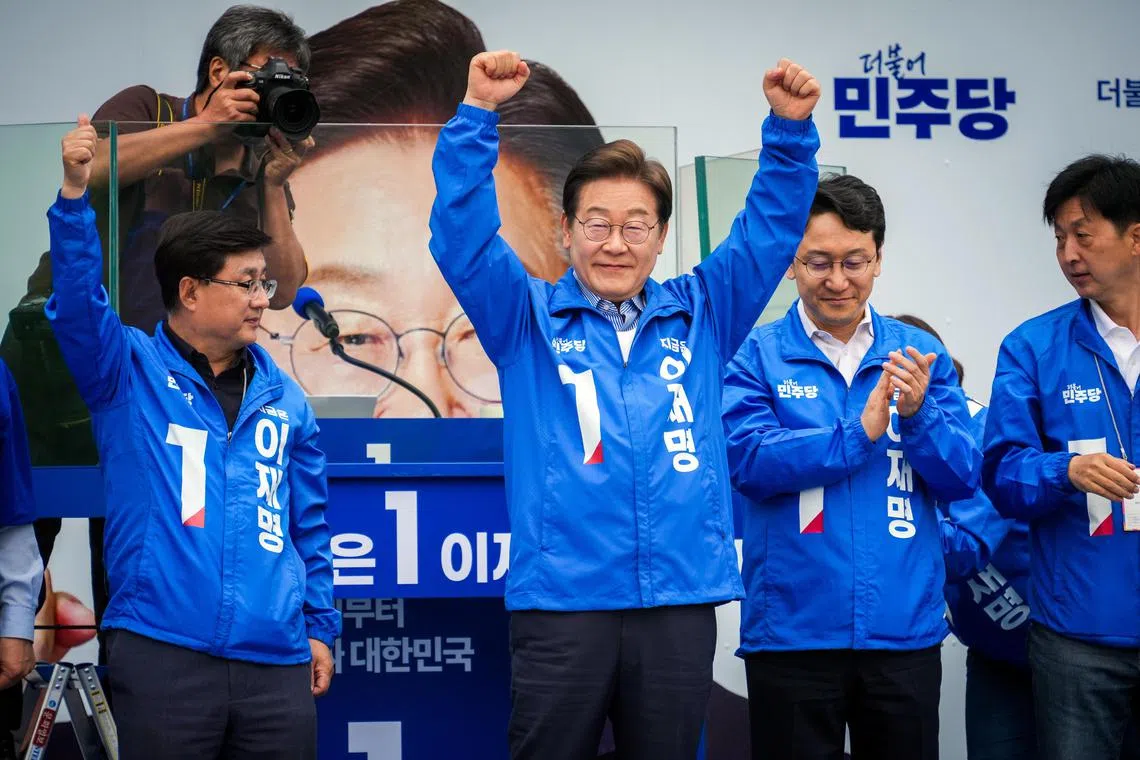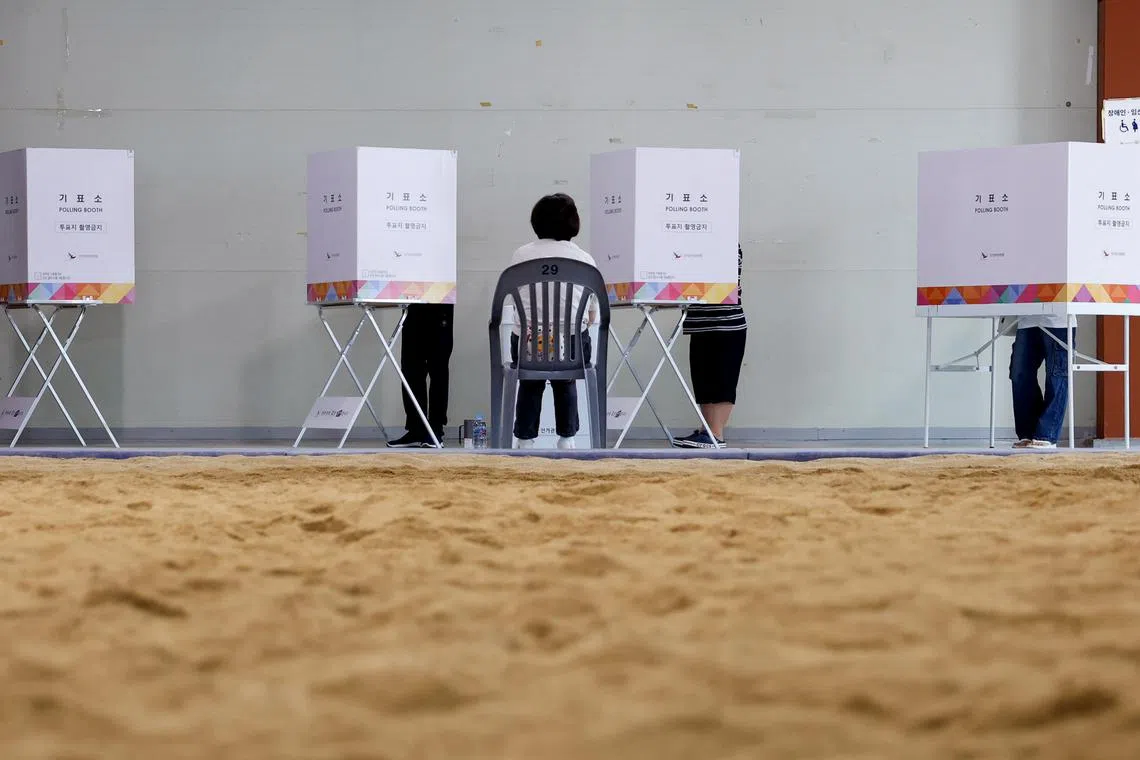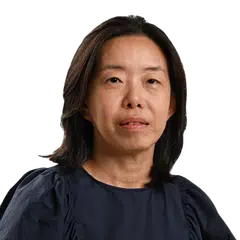Lee Jae-myung set to be South Korea’s new president
Sign up now: Get insights on Asia's fast-moving developments

Mr Lee Jae-myung (second from left), leader of the opposition Democratic Party, had been leading opinion polls even before the election date was announced.
PHOTO: JUN MICHAEL PARK/NYTIMES
SEOUL - Mr Lee Jae-myung, leader of the opposition Democratic Party, looks set to become South Korea’s next president, six months after a botched martial law declaration by then President Yoon Suk Yeol.
When voting closed at 8pm (7pm Singapore time) on June 3, a joint exit poll from South Korea’s three main broadcasters – MBC, KBS and SBS – showed Mr Lee leading at 51.7 per cent, with the ruling People Power Party’s (PPP) Mr Kim Moon-soo at 39.3 per cent and minor conservative party candidate Lee Jun-seok coming in at 7.7 per cent.
At 12.30am Singapore time, with 83 per cent of the votes counted, Mr Lee was leading with 48.3 per cent while Mr Kim came in at 42.9 per cent.
At around the same time, Mr Kim conceded defeat at a press conference while Mr Lee went onstage at the National Assembly and told supporters that he was “highly likely to become the president”.
“I will do my best to revive the economy and restore people’s livelihoods,” he said.
Mr Lee, 61, was expected to win as he had been leading opinion polls even before the election date was announced, and went on to maintain a double-digit lead over his rivals throughout the 22-day campaign.
The snap election was widely seen as a referendum on the short-lived Dec 3, 2024 stripped of his powers
A total of 35.2 million people voted, representing 79.4 per cent of 44.39 million eligible voters, the highest since the 1997 presidential election, which had an 80.7 per cent turnout.
Kyung Hee University political scientist Ahn Byong-jin said Mr Lee’s win was “predictable”, adding that his vote share of slightly above 50 per cent shows that South Koreans are actually still divided about him.
“For him not to hit 60 per cent of the vote share, it shows that there is still a trust gap,” said Professor Ahn.
Mr Lee likely won over only half of the moderate voters, he added, while it was quite clear that the conservatives had dug in their heels and voted for the PPP’s Mr Kim.
South Korea’s electorate is widely seen to be split evenly, with both conservatives and liberals taking up 35 per cent each, while moderates account for 30 per cent.
It is second time lucky for Mr Lee, who lost the 2022 presidential election
Mr Lee had focused his campaign on ending the internal strife roused by Yoon’s martial law chaos, and restoring the dignity of the country’s democracy.
He has pledged to change the country’s constitutional law to make it harder for the sitting president to declare martial law, and also for the president to serve two consecutive four-year terms instead of the current single-term of five years.
And, while he has also promised to bring all those involved in the martial law debacle to justice, Mr Lee has said reviving the country’s economy takes top priority.
“There are numerous areas that need reform, but restoring the economy and people’s livelihoods is more urgent than reform at the moment,” he said during a campaign trail stop in Seongnam on June 2.
The city of Seongnam, 30 minutes’ drive south of Seoul, was the launchpad for Mr Lee’s political career in 2010 when he was elected mayor. He went on to serve in Seongnam until 2018, when he was elected governor of Gyeonggi province, which surrounds the city of Seoul.
Seongnam is also where Mr Lee’s impoverished family moved to from his home town of Andong when he was 12 years old.

Voters at a polling station in Seongnam, South Korea, on June 3.
PHOTO: REUTERS
As the fifth of seven children, Mr Lee helped his mother clean toilets at a market before working as a child labourer in various factories, where exposure to toxic chemicals cost him his sense of smell and a workplace incident left his left arm permanently injured.
He eventually made it to law school on a scholarship and became a human rights lawyer before entering politics in 2005.
Mr Lee is often referred to as the “phoenix” for his political resilience and uncanny ability to survive multiple crises. These include scandals unearthed during his 2022 presidential bid, a knife attack in January 2024
Two separate cases, one on election law violation charges for the 2022 presidential race, and another of bribery charges during his Seongnam city mayorship, are set to be heard in court later in June.
These controversies have made Mr Lee a divisive figure, with the South Korean police receiving reports of at least 11 threats to his life as at May 23. For most of the presidential campaign, he wore bulletproof vests and spoke behind a protective barrier.
It is unclear what will happen to Mr Lee if he is found guilty by the courts after being elected president, as under South Korea’s Constitution, a sitting president cannot be criminally prosecuted except in cases of insurrection or treason.
But political observers told The Straits Times that they believe Mr Lee’s Democratic Party, which also dominates the country’s Parliament, will soon push for a Bill that would suspend the President-elect’s legal cases until his five-year presidential term is complete.
Kyung Hee University’s Prof Ahn said he does not expect public opinion to be strongly against such a proposal.
“South Koreans will want him to be successful no matter what. Nobody wants to change presidents again. People need that kind of stability right now.”
Kyonggi University political science and law expert Hahm Sung-deuk says there is usually a “honeymoon period” of about 100 days, during which he expects Mr Lee and his party to “push as many Bills as they can”.
Speech therapist Hong San-ja, 50, told ST that she did not believe Mr Lee’s legal troubles would impact his leadership abilities.
Ms Hong said that based “on his accomplishments thus far, I have stronger trust in him to lead the country”.
But another voter, retired engineer Chun C.J., 76, said he thinks a leader who governs a country should be “morally and ethically upright”.
“The vote is not for me, it is for my grandchildren, I want them to grow up in a proper, well-governed country where they can live and thrive. That’s the spirit in which I cast my vote,” he said.
Mr Lee has little time to celebrate before plunging right into work.
As Yoon’s impeachment necessitated the snap election, Mr Lee will begin his term as soon as the National Election Commission certifies the result, which is expected to happen by 9am on June 4.
The inauguration ceremony, a basic affair, will take place two hours later at 11am at the National Assembly.
In an election under normal circumstances, the transition between governments customarily takes 60 days.
Despite the lack of a transition period, Professor Hahm believes Mr Lee and his party would have no issues taking over the reins of the government.
“The Democratic Party went through this in 2017, when former president Moon Jae-in was elected after predecessor Park Geun-hye’s impeachment. So this will be their second time taking over the government without a transition. They are well prepared this time.”
Wendy Teo is The Straits Times’ South Korea correspondent based in Seoul. She covers issues concerning the two Koreas.



